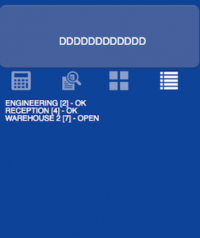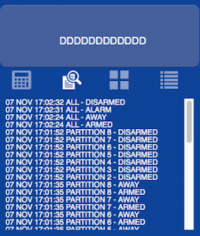Difference between revisions of "Bentel"
(Created page with "Category:UI Objects") |
|||
| Line 1: | Line 1: | ||
| − | [[Category: | + | The Bentel KYO320 is an advanced, multi-area security system integrated HSYCO. |
| + | The KYO320 driver in HSYCO supports the integration of more than one KYO320 unit on the same HSYCO SERVER. | ||
| + | The integration with HSYCO can be accomplished through the standard RS-232 port on the KYO320’s motherboard. | ||
| + | |||
| + | [[Category:I/O Server]] | ||
| + | |||
| + | == Communication == | ||
| + | |||
| + | Employ a DE-9 (often called DB-9) female-female RS-232 crossed cable to connect the RS-232 KYO port to the serial port on HSYCO SERVER. The cable must follow this pinout diagram: | ||
| + | |||
| + | 2 ↔ 3 | ||
| + | 3 ↔ 2 | ||
| + | 5 ↔ 5 | ||
| + | |||
| + | RS-232 parameters: | ||
| + | {| class="wikitable" | ||
| + | | '''Baud rate''' | ||
| + | | same as defined on the KYO320 (usually 9600, 38400 or 57600) | ||
| + | |- | ||
| + | | '''Data bits''' | ||
| + | | 8 | ||
| + | |- | ||
| + | | '''Stop bit''' | ||
| + | | 1 | ||
| + | |- | ||
| + | | '''Parity''' | ||
| + | | even | ||
| + | |- | ||
| + | | '''Flow control''' | ||
| + | | none | ||
| + | |} | ||
| + | |||
| + | |||
| + | == HSYCO Configuration == | ||
| + | |||
| + | === Options === | ||
| + | |||
| + | {| class="wikitable" | ||
| + | !ID | ||
| + | !Default | ||
| + | !Values | ||
| + | !Description | ||
| + | |||
| + | |- | ||
| + | |||
| + | |rowspan="2"|gui | ||
| + | |rowspan="2"|true | ||
| + | |true | ||
| + | |enable support for the UI object, UISET actions and USER commands | ||
| + | |- | ||
| + | |false | ||
| + | |disable UI support | ||
| + | |||
| + | |- | ||
| + | |||
| + | |rowspan="2"|language | ||
| + | |rowspan="2"|system language | ||
| + | |en | ||
| + | |- | ||
| + | |it | ||
| + | |rowspan="2"|language of log and display messages. Supported values are it and en | ||
| + | |||
| + | |- | ||
| + | |||
| + | |logsize | ||
| + | |50 | ||
| + | |n ≥ 0 | ||
| + | |the number of log lines to display in the UI object | ||
| + | |||
| + | |- | ||
| + | |||
| + | |polltime | ||
| + | |1000 | ||
| + | |n ≥ 0 | ||
| + | |the data polling interval, in milliseconds. Shorter time improve the response of the system, but increase the load on the CPU of both HSYCO and the KYO system | ||
| + | |||
| + | |||
| + | |||
| + | |} | ||
| + | |||
| + | === bentel.ini === | ||
| + | |||
| + | The bentel.ini file is an optional configuration file located in the main directory (same directory as hsyco.ini or hsyco.jar) and used to define zones and partitions names. If defined, these names will be used instead of the original numbers in the log files and the bentel GUI object. | ||
| + | |||
| + | The bentel.ini is automatically detected at start-up. Changes to this file become effective when the I/O Server is restarted. | ||
| + | |||
| + | For each zone or partition, enter a line formatted as: | ||
| + | |||
| + | <pre> | ||
| + | <io_server_id>.zone.<n> = <name> | ||
| + | <io_server_id>.area.<n> = <name> | ||
| + | </pre> | ||
| + | |||
| + | For instance: | ||
| + | |||
| + | <pre> | ||
| + | kyo.zone.1 = kitchen | ||
| + | kyo.zone.2 = garage | ||
| + | kyo.area.1 = basement | ||
| + | kyo.area.2 = second floor | ||
| + | </pre> | ||
| + | |||
| + | == Datapoints == | ||
| + | |||
| + | {| class="wikitable" | ||
| + | !ID | ||
| + | !Value | ||
| + | !R/W | ||
| + | !Description | ||
| + | |||
| + | |- | ||
| + | |||
| + | |rowspan="2" |connection | ||
| + | |online | ||
| + | |R | ||
| + | |connection established | ||
| + | |- | ||
| + | |offline | ||
| + | |R | ||
| + | |HSYCO can't connect to the panel | ||
| + | |||
| + | |- | ||
| + | |||
| + | |||
| + | |||
| + | |||
| + | |||
| + | == User Interface == | ||
| + | |||
| + | === Bentel Object === | ||
| + | |||
| + | {{:Bentel_(UI Object)}} | ||
| + | |||
| + | |||
| + | === UISET Actions === | ||
| + | |||
| + | {| class="wikitable" | ||
| + | !ID | ||
| + | !Attribute | ||
| + | !colspan="2"|Set to | ||
| + | |- | ||
| + | |log | ||
| + | |text | ||
| + | |colspan="2"|latest security log lines (as many as specified by the 'logsize' option) | ||
| + | |- | ||
| + | |log0 | ||
| + | |text | ||
| + | |colspan="2"|latest line of the security log when a new entry is added, set back to blank after a short period | ||
| + | |- | ||
| + | |c<n>.name | ||
| + | |text | ||
| + | |colspan="2"|name assigned to circuit <n> or its number if no name is defined | ||
| + | |- | ||
| + | |rowspan="2"|connection.label | ||
| + | |rowspan="2"|visible | ||
| + | |true | ||
| + | |when datapoint connection = offline | ||
| + | |- | ||
| + | |false | ||
| + | |when datapoint connection = online | ||
| + | |- | ||
| + | |rowspan="2"|<datapoint_id>.label.1 | ||
| + | |rowspan="2"|visible | ||
| + | |true | ||
| + | |when datapoint with ID <datapoint_id> has value '1' | ||
| + | |- | ||
| + | |false | ||
| + | |when datapoint with ID <datapoint_id> has value '0' | ||
| + | |- | ||
| + | |rowspan="2"|<datapoint_id>.label.0 | ||
| + | |rowspan="2"|visible | ||
| + | |true | ||
| + | |when datapoint with ID <datapoint_id> has value '0' | ||
| + | |- | ||
| + | |false | ||
| + | |when datapoint with ID <datapoint_id> has value '1' | ||
| + | |} | ||
| + | |||
| + | === USER Commands === | ||
| + | |||
| + | {| class="wikitable" | ||
| + | !Name | ||
| + | !Param | ||
| + | !Action | ||
| + | |||
| + | |- | ||
| + | |||
| + | |rowspan="2" |armed | ||
| + | |0 | ||
| + | |disarm all groups | ||
| + | |- | ||
| + | |1 | ||
| + | |arm all groups | ||
| + | |||
| + | |- | ||
| + | |||
| + | |rowspan="2" |g<n>.armed | ||
| + | |0 | ||
| + | |disarm group <n> | ||
| + | |- | ||
| + | |1 | ||
| + | |arm group <n> | ||
| + | |||
| + | |- | ||
| + | |||
| + | |rowspan="2" |c<n>.bypassed | ||
| + | |0 | ||
| + | |unbypass zone <n> | ||
| + | |- | ||
| + | |1 | ||
| + | |bypass zone <n> | ||
| + | |||
| + | |- | ||
| + | |||
| + | |rowspan="2" |c<n>.isolated | ||
| + | |0 | ||
| + | |un-isolate zone <n> | ||
| + | |- | ||
| + | |1 | ||
| + | |isolate zone <n> | ||
| + | |||
| + | |- | ||
| + | |||
| + | |rowspan="2" |c<n>.soaked | ||
| + | |0 | ||
| + | |un-soak zone <n> | ||
| + | |- | ||
| + | |1 | ||
| + | |soak zone <n> | ||
| + | |||
| + | |- | ||
| + | |||
| + | |system | ||
| + | |reset | ||
| + | |reset alarms | ||
| + | |||
| + | |} | ||
Revision as of 10:50, 23 December 2013
The Bentel KYO320 is an advanced, multi-area security system integrated HSYCO. The KYO320 driver in HSYCO supports the integration of more than one KYO320 unit on the same HSYCO SERVER. The integration with HSYCO can be accomplished through the standard RS-232 port on the KYO320’s motherboard.
Contents
Communication
Employ a DE-9 (often called DB-9) female-female RS-232 crossed cable to connect the RS-232 KYO port to the serial port on HSYCO SERVER. The cable must follow this pinout diagram:
2 ↔ 3 3 ↔ 2 5 ↔ 5
RS-232 parameters:
| Baud rate | same as defined on the KYO320 (usually 9600, 38400 or 57600) |
| Data bits | 8 |
| Stop bit | 1 |
| Parity | even |
| Flow control | none |
HSYCO Configuration
Options
| ID | Default | Values | Description |
|---|---|---|---|
| gui | true | true | enable support for the UI object, UISET actions and USER commands |
| false | disable UI support | ||
| language | system language | en | |
| it | language of log and display messages. Supported values are it and en | ||
| logsize | 50 | n ≥ 0 | the number of log lines to display in the UI object |
| polltime | 1000 | n ≥ 0 | the data polling interval, in milliseconds. Shorter time improve the response of the system, but increase the load on the CPU of both HSYCO and the KYO system
|
bentel.ini
The bentel.ini file is an optional configuration file located in the main directory (same directory as hsyco.ini or hsyco.jar) and used to define zones and partitions names. If defined, these names will be used instead of the original numbers in the log files and the bentel GUI object.
The bentel.ini is automatically detected at start-up. Changes to this file become effective when the I/O Server is restarted.
For each zone or partition, enter a line formatted as:
<io_server_id>.zone.<n> = <name> <io_server_id>.area.<n> = <name>
For instance:
kyo.zone.1 = kitchen kyo.zone.2 = garage kyo.area.1 = basement kyo.area.2 = second floor
Datapoints
User Interface
Bentel Object
The user interface for the Bentel KYO320 multi-area intrusion detection system:
The Bentel object is listed in the Project Editor’s new object list only when at least one Bentel I/O Server is defined.
Parameters
- server id: the server ID. Supports Redirect variables
- position: the object's position. Use the pixels or rows and columns coordinates format
Syntax
(bentel <server id>; <position>)
E.g.
(bentel serverid; x10y20)
UISET Actions
| ID | Value | R/W | Description |
|---|---|---|---|
| connection | online | R | connection established |
| offline | R | HSYCO can't connect to the panel |
| ID | Attribute | Set to | |
|---|---|---|---|
| log | text | latest security log lines (as many as specified by the 'logsize' option) | |
| log0 | text | latest line of the security log when a new entry is added, set back to blank after a short period | |
| c<n>.name | text | name assigned to circuit <n> or its number if no name is defined | |
| connection.label | visible | true | when datapoint connection = offline |
| false | when datapoint connection = online | ||
| <datapoint_id>.label.1 | visible | true | when datapoint with ID <datapoint_id> has value '1' |
| false | when datapoint with ID <datapoint_id> has value '0' | ||
| <datapoint_id>.label.0 | visible | true | when datapoint with ID <datapoint_id> has value '0' |
| false | when datapoint with ID <datapoint_id> has value '1' | ||
USER Commands
| Name | Param | Action |
|---|---|---|
| armed | 0 | disarm all groups |
| 1 | arm all groups | |
| g<n>.armed | 0 | disarm group <n> |
| 1 | arm group <n> | |
| c<n>.bypassed | 0 | unbypass zone <n> |
| 1 | bypass zone <n> | |
| c<n>.isolated | 0 | un-isolate zone <n> |
| 1 | isolate zone <n> | |
| c<n>.soaked | 0 | un-soak zone <n> |
| 1 | soak zone <n> | |
| system | reset | reset alarms |



